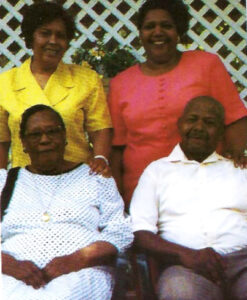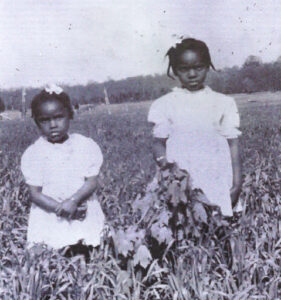Keeping It in The Family: Sisters hold onto heirloom farm in honor of father.
This article was excerpted from Ag Families magazine, fall 2016; shared by Rev. Josephine Furlow (Class of 1982) who currently serves on the UUMS Board of Directors.
Since their father purchased the 61-acre farm in 1952, Rev. Josephine Furlow (Class of 1982) and her older sister, Dorothy Tolliver, have proudly helped to keep their family farm going and growing.
Here’s the article by Zirconia Alleyne, Editor of Ag Families magazine.
“It’s been almost a decade since William “Jack” Abshire died, but his two daughters and a visionary granddaughter are keeping his 61-acre farm in the family, hoping to honor his life’s work and to encourage other black farmers to keep farms in their families.
“There’s a lot of pride in it,” said Abshire’s oldest daughter, Dorothy Tolliver, who stays at the farm regularly. “Daddy worked from bootstraps up, and he put a lot of blood, sweat, and tears into that, so why would we say, ‘It doesn’t mean anything’ and just let it go?”
William started out as a sharecropper and then became a tenant. When he bought his own farm in 1952, he went from being an employee to an employer. “Some people weren’t able to understand how he was able to do that being an Afro-American,” she said. Dorothy was 10 years old when her father bought the farm in Logan County. Her sister, Josephine Abshire-Furlow loved being outside helping their dad. He raised everything from corn and tobacco to chickens, cows, and pigs.
“We slaughtered our own pigs,” Dorothy recalled. “It was cold as the dickens outside when we did that because they didn’t want the meat to spoil.”
Dorothy remembers stuffing sausage casings and canning some of the meat with their late mother, Precious.
The sisters also have fond memories of driving the mule and wagon to pull corn, helping with the tobacco, and eating fresh tomatoes out of the patch.
“In the summertime, we would take sugar or salt and put it in a little plastic bag, and you’d get a tomato off the vine and eat that, then you’d take off, and you’d work some more,” Dorothy said.
“There’s nothing that goes on at the farm that I don’t tell her,” Dorothy said about making decisions with Josephine, who lives in Detroit.
That’s just the way we were raised, Dorothy said, to do everything as a family, from work to church to decision-making.
In hindsight, Josephine—a retired college professor—said their parents were visionaries, and they taught them to be responsible and dedicated and to take care of everything they had.
“He had the foresight of looking forward and seeing what he wanted his family to do and be,” she said, “and that was to have your land, grow your own crops, and have your own livestock – jus have your own.”
“I think it’s important to hold onto the land because that’s the legacy they left – a legacy of land and ownership,” she continued.
Dorothy said his mindset opened the door of opportunity, despite the fact that he wasn’t college educated.
William served on the Logan County Farm Service Agency board and was so respected by the staff that several of them were pallbearers at his funeral, Dorothy noted.
“He was able to go into banks and sit down with bankers and lawyers and know what he had in mind, to know the types of loans he wanted to get and being able to invest,” she said.
Dorothy said as long as they can keep the land, that’s what they are going to do. Although her son, Kenneth, has no interest in farming. Janet, who has a master’s degree in counseling and human development, hopes to one day inherit the farm.
Her vision is to open a transitional housing facility for felons and the homeless to learn work skills and how to be self-sufficient.
“I want to let them know what it is to grow a crop,” Janet said. “I would love to work with drug and alcohol offenders because when you have a felony offense, it’s hard to get a job.
“I would let them work the land, let them grow and cook their own food and make it a skill builder for resumes,” she continued. “If I can get this established—and that is my goal—I would, but it is up to them,” she said, looking at her mother.
At the end of the day, Dorothy said they will keep the farm in the family. She hopes to encourage other minority farm families to hold onto their land, if only for the location to be a family heirloom or meeting place.
“There are no African American farmers up there anymore, except for one, and there used to be a lot of them up there,” Dorothy said. “In the essence of it being home, we can still go back. We stay there, and we have our family functions there.
Josephine comes down to visit periodically, and Dorothy spends days at a time on the farm tending to the cats that still live there. Janet looks forward to Thanksgiving at the farm every year.
The family lost most of their memorabilia in a fire when Dorothy and Josephine were little girls, but a neighbor had a photo of the sisters that she gave them as a keepsake.
Dorothy said the rapport and camaraderie is still strong among the farm families and friends their parents made in Logan County. She said her father was respected and loved by many because of his giving spirit and caring demeanor.
“He had people working for him, but he treated people like he wanted to be treated…” she said. “He would bend over backwards to help you if he could.”
Most of all, Josephine said her father was passionate about farming, her mother was dedicated to everything that involved the family, and at the center of it all was God. Precious served on the church Mother’s Board and William was a deacon.
“You never heard my dad complain,” Josephine said. “I know as hard as he worked, he had to be tired, but he didn’t complain.”
“He had a lot of love in what he did. The proof is in the pudding.”
Rev. Josephine Furlow graduated from Unity Urban Ministerial School in 1982. She was ordained in 1985. She currently serves on the UUMS Board of Directors


